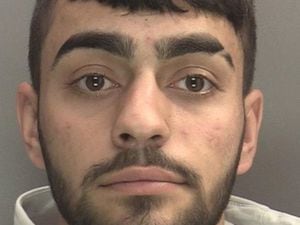Police cleared on Kevin Nunes gangland murder probe: Express & Star investigates
As four top police officers are cleared over the botched investigation into the gangland murder of Kevin Nunes, the Express & Star investigates the story of a promising footballer betrayed by friends and killed over a cocaine turf war.
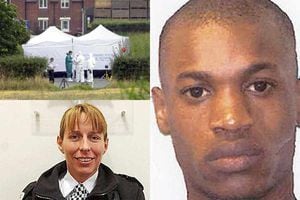
Mr Nunes, aged 20, from Whitmore Reans, was executed in a firing squad-style attack in a country lane 13 years ago.
His bullet-ridden body was found in Clive Road, Pattingham, on September 19, 2002.
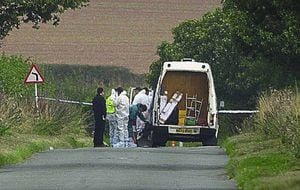
He had played football semi-professionally for Stafford Rangers and had been on the books of Tottenham Hotspur.
Around 180 officers were involved in the probe surrounding his murder, with officers making inquiries as far afield as Jamaica.
It was one of the biggest murder investigations conducted by the force.
A total of 1,060 statements were taken and more than 200 pieces of information were received from the public. But after nearly three years the investigation had got nowhere.
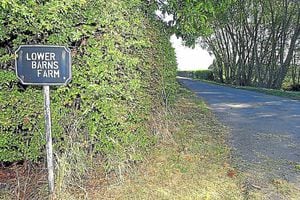
They had hit a wall of silence. Then the evidence of one witness would be a game-changer.
That witness was Simeon Taylor who was taken into the witness protection scheme.
In 2008, five Black Country gangsters Adam Joof of Willenhall, Levi Walker of Birmingham, Antonio Christie of Great Bridge, and Owen Crooks and Michael Osbourne both of Wolverhampton were given life sentences after being found guilty of the 20-year-old's murder at Leicester Crown Court.
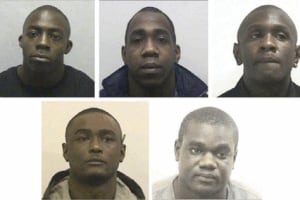
But four years later the five men had their convictions quashed in the Court of Appeal.
The court revealed serious police failings and concerns had not been disclosed at the original murder trial.
They included:
Detectives went drinking and to nightclubs with the witness.
A detective on the case had an affair with another officer and met at the witnesss safe hotel location which could have led to evidence contamination.
And a crime committed by the witness went unreported.
Lord Justice Hooper declared that there appeared to be a 'serious perversion of the course of justice' and a 'shocking episode'.
September 19, 2002 Kevin Nunes bullet-ridden body is found on a grass verge off Clive Road, Pattingham, just before 10pm.
September 25, 2002 Detectives announce a man is under arrest in Aberdeen. He is later released.
September 30, 2002 The detective leading the hunt for the killers admits officers are probing drugs links to the death, which could explain the reluctance of witnesses to come forward.
October 2002 Armed police arrest a man in Heath Town. He is later released. Detectives say five men seen at The Fox pub at Shipley may hold vital clues. They reject claims that a notorious Yardie gangster, who was believed to be dead but had reportedly been sighted, is linked to the murder. Officers on the Nunes case investigate links with other shootings in the Wolverhampton area.
November, 2002 Mr Nunes funeral is held as police admit they are no nearer to finding the killer.
2003 Further arrests. A documentary reveals how drug dealers in the Black Country are branching out as far away as Scotland in response to local supplies of crack cocaine reaching saturation point.
2004 Mr Nunes inquest hears he had been shot five times. Two chest wounds were fatal. Staffordshire South coroner Andrew Haigh records a verdict of unlawful killing.
To mark the second anniversary, Staffordshire detectives put up a £25,000 reward. Police speak to people living nearby in the hunt for new leads.
September, 2005 Detectives say they have fresh information that Mr Nunes met his killers in a pub car park.
March, 2006 Owen Crooks is arrested at gunpoint in Wolverhampton. He becomes the first person to be charged with Mr Nunes murder almost four years on.
February, 2006 Levi Walker is jailed for life for the murder of Smethwick soldier Narel Sharpe.
April, 2006 Adam Joof is jailed for 12 years for heading a major West Midlands-based drugs gang. He had earlier been charged with Kevin Nunes murder while on remand.
October, 2007 Walker, Joof, Crooks, Michael Osbourne and Antonio Christie go on trial at Leicester Crown Court accused of Kevin Nunes murder.
January 2008 Walker, Joof, Crooks, Osbourne and Christie are found guilty of murder. They are given sentences totalling 135 years.
2008 Key prosecution witness Simeon Taylor boasts that he lied in court.
July 27, 2009 Appeal launched and Court of Appeal directs Criminal Cases Review Commission to investigate.
2011 The IPCC launches an independent investigation Operation Kalmia into 14 former and serving Staffordshire Police officers. Led by Chief Constable of Derbyshire Mick Creedon, it focuses on how a protected witness was dealt with and disclosure issues prior to the trial.
March 8, 2012 Court of Appeal quashed murder convictions declaring a serious perversion of the course of justice.
2014 In January and November Crown Prosecution Service says 14 officers will not face any criminal charges.
November 2014 IPCC announces Operation Kalmia has been concluded.
March 2015 Police and Crime Commissioners in Staffordshire and Northamptonshire say their respective Chief Constables should face no discplinary action over the failings.
March 2016 Senior officers cleared of wrongdoing by IPCC
Before the initial murder court case, Detective Inspector Joe Anderson, who headed Staffordshire's Sensitive Policing Unit, first went to bosses with concerns over the investigation – particularly the handling of the prosecution's star witness Taylor.
He claimed there was 'corruption, dishonesty, and falsification' in the unit.
Mr Anderson joined the secretive unit in charge of witness protection and covert sources in September 2005.
What he found shocked him.
"The unit was dysfunctional," said the former Royal Marine. "When I joined I couldn't quite believe what was going on. There were a lot of egos and it was a culture almost of 'anything goes'."
On November 1, 2006, Superintendent Joe Costello and Chief Inspector Juliet Prince were requested by then-Assistant Chief Constable Suzette Davenport to conduct a management review of the Sensitive Policing Unit.
It followed a report made by Mr Anderson to then-Superintendent Jane Sawyers, who was head of professional standards, that there was 'corruption, falsification, and dishonesty' within the unit.
He also expressed concerns there was at 'at all costs' culture on the case and that it appeared the witness had been promised large sums of money as a reward.
He said: "There was always talk among members in the team about 'punching above our weight'. They saw it as a small county force solving serious drugs and gang-related killings that bigger forces couldn't. This was covert policing. A lot of it hadn't been done before and so not many people knew what was going on."
He became concerned when he heard of detectives going to nightclubs with Taylor.
And his concerns deepened after finding out Taylor had gone missing with £320 of police funds.
He had been booked to stay at a Holiday Inn in Preston, with the room paid for in advance by his handlers. But he cancelled the booking and pocketed the cash refund.
The disappearance was not reported and written up as a normal weekend. This was flagged up in the Court of Appeal judgment as a concern.
Mr Anderson said: "I had been told by another colleague confidentially that Taylor had gone missing. This was on the Monday morning but handlers continued to act as though there was no problem and they did not report the matter to me as they should have.
"I discovered the expense claim for the hotel was missing and asked the handlers for it. Of course they did not have it and were unable to claim it from the hotel because Taylor had checked himself out. My requests for a copy of the receipt were met by aggression."
This incident was documented in the management review report, which became known as the Costello Report.
Of the incident, The Court of Appeal judgment said: "The report examined evidence which showed that there was good reason to believe, and DI Anderson did believe that the officers concerned had deliberately not recorded the incident in the appropriate document intending thereby to prevent disclosure to the defence."
The judgment also revealed that the Costello report found that one of Taylor's handlers had arranged for a female officer, who was the disclosure officer on the case, to stay with him at the same hotel as the witness.
Former Detective Inspector Joe Anderson said he first raised concerns a decade ago and still no-one has been held accountable for what happened.
He said: "I served with Staffordshire Police for more than 20 years and I was proud to do so
"The vast majority of officers are honest, hard working and trust worthy.
"Unfortunately they are let down by a small number of officers that do not meet those high standards.
"I am disappointed that in my experience the executive officers of Staffordshire Police have not been willing to confront wrongdoing involving officers and senior managers.
"Staffordshire Police has let down the victim's family and the public by the sloppy way this investigation was handled.
"It is disgraceful that no individual has been held to account.
Isolated
"After taking my concerns to the head of professional standards, then Jane Sawyers, I was not supported.
"I was moved to other duties and left isolated.
"Whistleblowing within Staffordshire Police is not encouraged and individuals raising concerns are not supported.
"The IPCC has recommended disciplinary action against a number of officers, sadly those findings have been rejected.
"This inquiry has been incomplete and painfully slow, it has taken longer than many other major investigations including murders.
"This case has taken longer than even the Chilcott Inquiry into the Iraq War. The delay in concluding this matter is unacceptable, and reflects badly on Staffordshire Police and the IPCC.
"It has been nothing short of a compete shambles."
Police and Crime Commissioner Matthew Ellis said: "Whistleblowing is already used in policing and, on the face of it, appears to be reasonably successful.
"I would welcome any assessment of the effectiveness of police whistleblowing across the country and, depending on the outcome of any assessment, it may be that alternative arrangements would be beneficial to accountability and confidence of the public.
"Use of those might involve the IPCC but equally may be an alternative solution."
The Costello Report said: "Had there been an admission or evidence that she had met Simeon Taylor her position would have been untenable. Her actions could have also seriously undermined the integrity of the prosecution case."
Addressing the nightclub and drinking sessions between officers and the witness, the report said: "A defence lawyer may also think it appropriate and it could lead to undue inference being made as to the integrity and closeness of the relationship of the witness with the police."
Despite the concerns expressed by the senior officers, the Costello Report and its findings were never disclosed at the original Nunes murder trial. Mr Anderson felt there should have been a full-blown investigation, not a management review.
He said: "Documents deemed to be for management purposes are not routinely disclosed during proceeding, however, formal discipline investigations are disclosed.
"I believe that this is why only a 'management review' was commenced rather than a formal investigation. It was a whitewash."
Had the concerns been disclosed, the defence could have called Mr Anderson to the witness box knowing he had raised concerns over the case. The jury may have been swayed that the evidence of Taylor was unreliable and that the investigation was compromised.
Mr Anderson said: "They pretended it did not exist. It was all done to keep it off radar."
In the Court of Appeal, Lord Justice Hooper said: "If, as should have happened, DI Anderson's ability to give evidence about the Sensitive Policing Unit had been disclosed, the information which DI Anderson was to give to the investigation would have been available then it may well be that the prosecution would not have proceeded with the trial, or the judge would have stopped the proceedings on the grounds that there had been gross prosecutorial misbehaviour." He added: "This was a very bad case of non-disclosure."
An investigation by the Independent Police Complaints Commission (IPCC) led by Derbyshire Police Chief Constable Mick Creedon, called Operation Kalmia, was launched in 2011. It looked into the conduct of 14 Staffordshire police officers linked to the case – including four in the most senior police positions in the country.
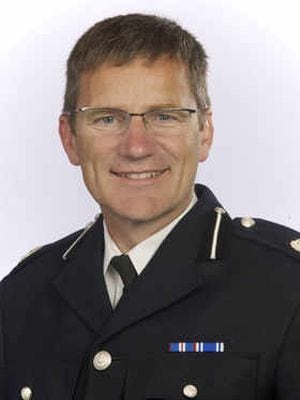
They are Staffordshire Chief Constable Jane Sawyers, Gloucestershire Chief Constable Suzette Davenport, West Midlands Assistant Chief Constable and hear of the counter terrorism unit Marcus Beale, and former Northamptonshire Chief Constable Adrian Lee.
After five years and £7.5 million spent on the IPCC investigation, the four senior officers were cleared even though Mr Creedon's report recommended they had a case to answer for gross misconduct.
The Police and Crime Commissioners of Staffordshire, Gloucestershire and Northamptonshire overruled the investigation's recommendations and said their Chief Constables had no case to answer. The same decision was taken by the now-retired West Midlands Chief Constable Chris Sims in regards to his Assistant Chief Constable Marcus Beale.
The IPCC then decided to accept the authorities' decisions. The IPCC said it found no evidence of a cover up or of wilful omission by any of the four senior officers.
Previously the Crown Prosecution Service ruled there was 'insufficient evidence' to criminally charge any of the 14 officers over misconduct in public office and perverting the course of justice.
Two Detective Constables at Staffordshire, who neither the IPCC or the force will name, faced disciplinary action over their role in botched inquiry as a result of Operation Kalima.
One received 'management advice' and later resigned, the other was allowed to retire on health grounds.
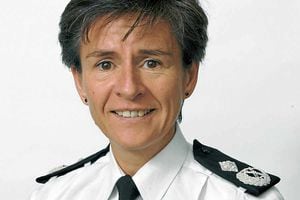
Despite there being broad agreement that there were serious failings at Staffordshire Police over the affair, yesterday's decision means no one will be held accountable for what happened.
And the full report detailing the investigations findings will eventually be published – but could be delayed by months.
IPCC Deputy Chair Sarah Green said: "This has been an extremely complex and lengthy investigation. There is broad agreement that there were serious failings at Staffordshire Police following the murder of Kevin Nunes in 2002 and the conviction of five defendants for that murder in 2008. However, cases for gross misconduct or misconduct have been rejected by the appropriate authorities who are responsible for holding misconduct hearings. After careful consideration I have accepted the appropriate authorities' assessments and decided not to issue directions that misconduct hearings be held."
Mr Anderson says he found himself sidelined for speaking out and he launched a grievance with Staffordshire Police. The force settled and paid him an undisclosed sum.
It led to then Staffordshire Chief Constable Chris Sims to write to him, stating: "Your decision to challenge what you considered to be unacceptable and unprofessional behaviour was entirely correct and that Staffordshire Police encourages all members of staff to take such action if they believe that acceptable standards have been breached."
Meanwhile, Kevin Nunes' killers have never been brought to justice.



